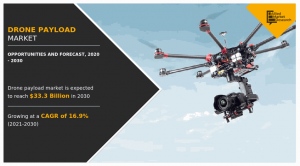We’ve seen plenty of exciting applications of drone technology in Africa. Unsurprisingly, most of them are driven by necessity, far removed from the relatively frivolous notion of an Amazon prime delivery service or some kind of milkshake on-demand courier.
US startup Zipline has long been established on the continent, providing vital infrastructure for medical deliveries in Rwanda and, more recently, Tanzania. Drones have also been deployed in the fight against Malaria in Malawi and used to combat illegal poaching across the continent.
Drones prevent illegal fishing in Seychelles
Previously the use of drones to prevent poaching has occurred on land. But one north-African startup is taking the technology to the ocean: ATLAN Space.
The company’s FishGuard program was recently awarded $150,000 by the National Geographic Society in its Competition to Combat Illegal Fishing, a search for innovative solutions and technologies that protect and sustain fisheries in coastal communities.
FishGuard is a partnership between ATLAN Space, Grid-Arendal and Trygg Mat Tracking. The aim is to use drones to identify and reduce illegal fishing in the Republic of Seychelles.
Together they are monitoring huge swathes of the ocean with fully autonomous drones guided by computer vision and AI.
To fight IUU ((illegal, unreported, unregulated) fishing and protect the sustainability of our oceans, we have created FishGuard, a fully scalable and adaptable solution that allows institutions to monitor millions of km2 while hugely decreasing the patrolling costs and greatly increasing the efficiency. FishGuard is a unique combination of autonomous drones guided by Artificial Intelligence, with field experience and capacity building.” – Badr Idrissi, ATLAN Space
Investigating threats from above
Currently, authorities have to use light aircraft or coast guard vessels to keep tabs on boats’ activities.
So how will FishGuard work? Starting in October, the pilot program will use drones that have been pre-programmed with GPS data outlining hotspots for illegal fishing activities.
Once above the location, the drone’s AI will register the type of ships that are present on the water, from cruising boats, to tankers to fishing vessels. The drone will then establish whether the boat is an authorized fishing vessel.
If the system comes back negative, the drone will register the boat’s location, identification number and relay the data back to the authorities via satellite.
“With artificial intelligence, we are able to replace the pilot, the data analyst, transmission equipment, and with that we can reduce the cost,” says Idrissi.
Malek Murison is a freelance writer and editor with a passion for tech trends and innovation. He handles product reviews, major releases and keeps an eye on the enthusiast market for DroneLife.
Email Malek
Twitter:@malekmurison
https://dronelife.com/2018/08/20/drone-atlan-illegal-fishing-seychelles/
 Unmanned Aerial Vehicle The latest drone news
Unmanned Aerial Vehicle The latest drone news



